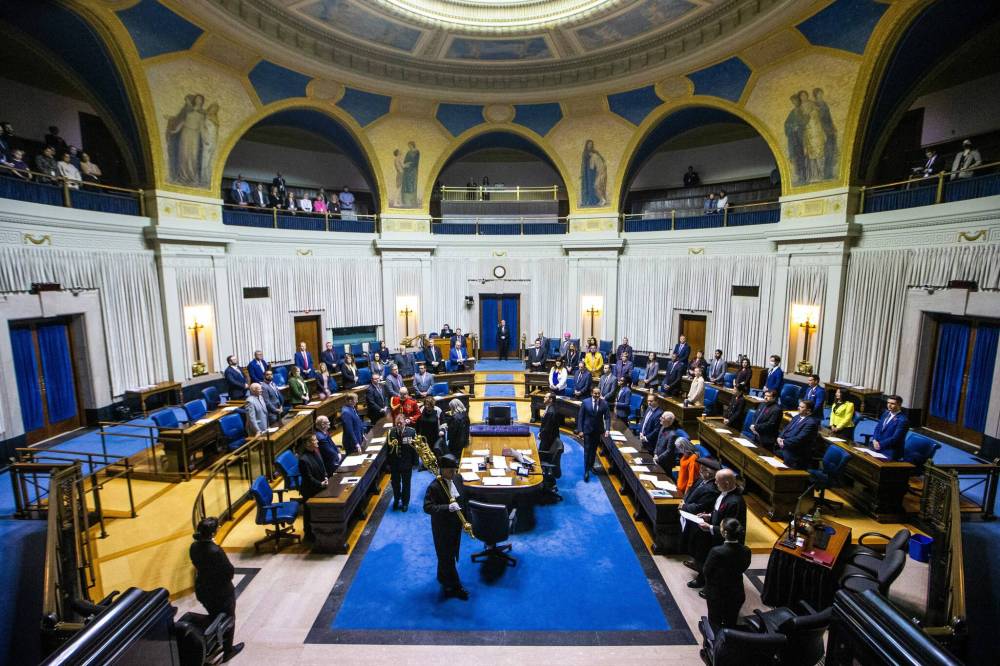I recall how shocked I was the first time I took my seat in the press gallery at the Manitoba legislature in 1994 and heard the opening words of the Speaker of the house.
“O eternal and almighty God, from whom all power and wisdom come, we are assembled here before thee to frame such laws as may tend to the welfare and prosperity of our province,” then-Speaker Denis Rocan said.
Yikes. I had no idea that in such a diverse society, where many people practise no religion at all — and those who do, come from many different faiths — that the legislative assembly still used a Christian-based prayer. Or any prayer.

MIKAELA MACKENZIE / FREE PRESS FILES
Speaker of the house, NDP MLA Tom Lindsey, has begun re-evaluating the opening prayer at the Manitoba legislature to see if it should be changed, or dropped altogether.
“Grant, O merciful God,” Rocan continued, “we pray thee, that we may desire only that which is in accordance with thy will, that we may seek it with wisdom and know it with certainty and accomplish it perfectly for the glory and honour of thy name and the welfare of all our people. Amen.”
Grant, O merciful God? We may desire only that which is in accordance with thy will? How inappropriate, I thought.
Fast-forward 30 years and the Speaker still recites the same antiquated prayer, even though many people in the chamber — and in society — are not Christian. For an institution that’s supposed to represent all members of society, regardless of religion (or no religion at all), it’s a pretty narrow statement that excludes a lot of people.
The new Speaker of the house, NDP MLA Tom Lindsey, wants to re-examine that. He has begun the process of re-evaluating the opening prayer to see if it should be changed, or dropped altogether. The matter will be dealt with by the legislative assembly through its rules committee. The call won’t be made by the Speaker, the government or any political party. It must be decided by MLAs.
Premier Wab Kinew says he will consult with Manitobans on the matter, which he, or any party leader or MLA, is free to do. But it won’t be decided by the premier; it will be the legislative assembly.
The first question the rules committee should ask itself is: why a prayer at all? Isn’t praying a private matter, something people do on their own, or among others with whom they share a faith? It has no place in a public setting such as a legislative assembly, where all people should feel a sense of belonging. When a Speaker recites a Christian prayer, or any prayer, it makes some people feel like outsiders.
I’m not religious and as a rookie reporter in 1994, I felt like a bit of an outsider when I first heard the Speaker recite the prayer. I wondered how others in the chamber felt, including MLAs and people in the public gallery who were not religious, or practiced some other faith.
If one of the legislative assembly’s primary objectives is to promote inclusivity, regardless of race, religion, gender, or sexual orientation, then the idea of reciting a prayer in the chamber should be scrapped.
The good news is the Speaker already recites something far more meaningful and inclusive in the house before the daily sitting: a land acknowledgement.
“We acknowledge we are gathered on Treaty 1 territory and that Manitoba is located on the treaty territories and ancestral lands of the Anishinaabeg, Anishininewuk, Dakota Oyate, Denesuline, Nehethowuk nations,” the Speaker says immediately after the prayer.
“We acknowledge Manitoba is located on the homeland of the Red River Métis. We acknowledge northern Manitoba includes lands that were and are the ancestral lands of the Inuit. We respect the spirit and intent of treaties and treaty making and remain committed to working in partnership with First Nations, Inuit and Métis people in the spirit of truth, reconciliation and collaboration.”
The land acknowledgement is relatively new. It was first recited in the chamber on Nov. 29, 2021 after it was agreed to by the rules committee. It’s far more relevant than a prayer because it speaks to treaties and other agreements between Indigenous and non-Indigenous people.
It celebrates the fact that we all live together on the ancestral lands of Indigenous people and we do so under the auspices of treaties and treaty-like agreements, such as the Manitoba Act (negotiated by delegates from the Red River Settlement, made up mostly of Métis people, and the federal government in 1870). It promotes inclusivity and mutual respect.
I can’t think of a better way to open the daily proceedings of the legislative assembly.
tom.brodbeck@freepress.mb.ca

Tom Brodbeck
Columnist
Tom has been covering Manitoba politics since the early 1990s and joined the Winnipeg Free Press news team in 2019.